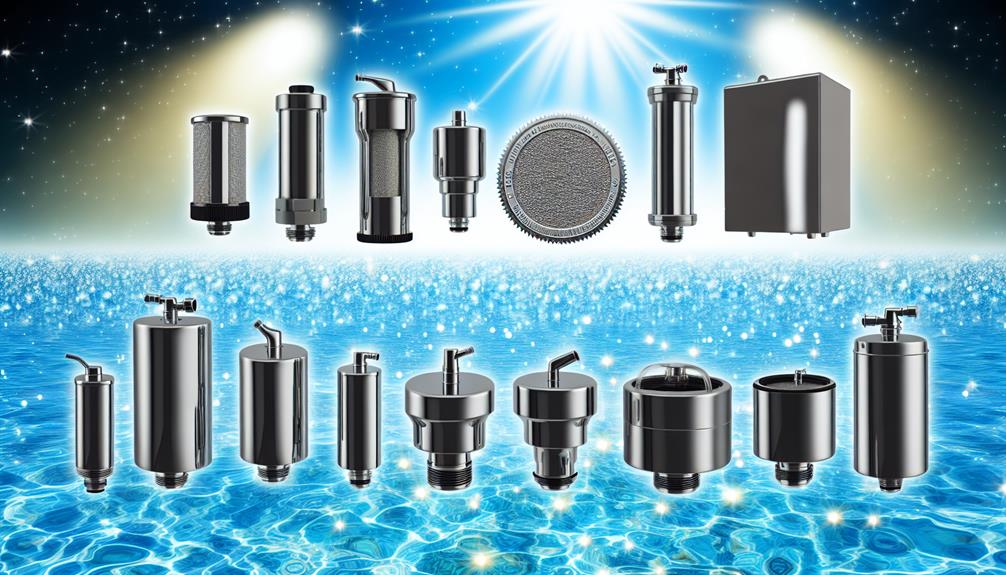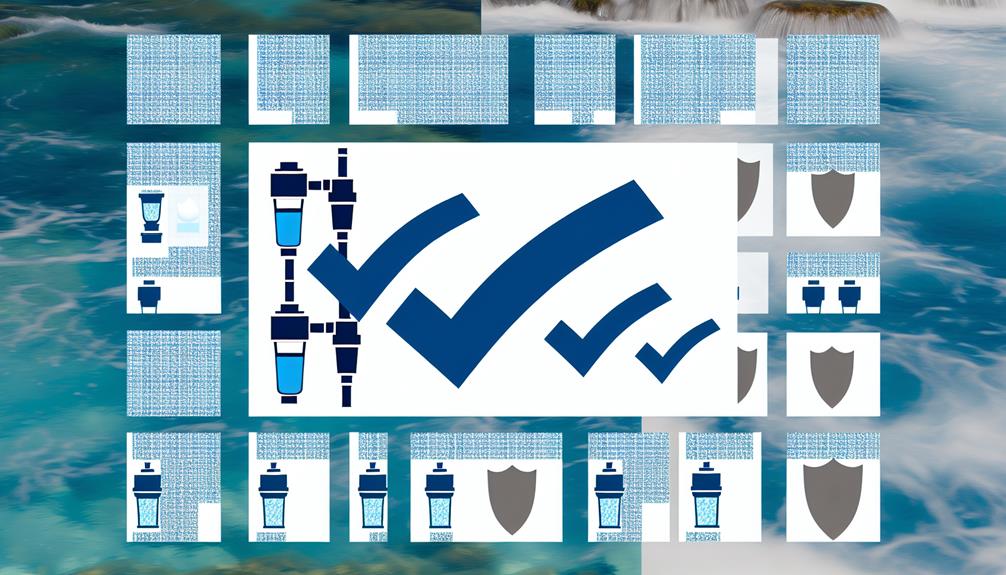Just as you're considering the complexities of water filtration in your industry, regulations surrounding the safety standards for industrial water filters are becoming increasingly stringent.
You're now faced with the critical task of ensuring that your filtration systems not only perform effectively but also comply with the safety standards set by authoritative bodies such as the NSF, FDA, and others. These standards are designed to safeguard not just the quality of water, but also the health of consumers and the environment.
As you navigate the maze of regulations, you must stay informed about the materials and processes that meet these rigorous guidelines. It's imperative to understand how to implement these standards to avoid the costly consequences of non-compliance.
Stick with me as we explore the essential steps to master compliance and understand the implications for your operations, opening the door to a clearer understanding of how to maintain the integrity of your water filtration systems and the trust of those who rely on them.
Identifying Relevant Regulations
To ensure industrial water filters meet safety and quality benchmarks, it's essential to navigate and comply with a suite of relevant regulations such as USP, FDA, NSF, and UL standards. You're tasked with aligning your water treatment solutions with federal regulations that safeguard public health and safety.
The USP delineates critical guidelines for safety of materials, especially those in contact with food, impacting filters used in food and beverage sectors. The FDA's oversight, under Title 21 CFR, ensures your filters are suitable for their intended use without introducing health-related contaminants into the production stream. It's crucial you're conversant with these regulations, as non-compliance can lead to significant repercussions, including product recalls or legal action.
Moreover, NSF standards, endorsed by the Environmental Protection Agency, provide a benchmark for the performance of municipal and residential water filtration systems. Adherence to these national standards is your key to certifying the efficacy of your filters in eliminating impurities and maintaining water quality.
NSF/ANSI Certification Process
Understanding the NSF/ANSI certification process is crucial, as it involves a series of stringent tests and evaluations to ensure that water filtration products meet established safety and performance standards. When you're dealing with water treatment systems for public or private drinking purposes, this certification is synonymous with safeguarding safe drinking water.
The process begins with a thorough assessment of the filtration system's materials for safety and structural integrity. Whether your product uses activated carbon, a semi-permeable membrane in reverse osmosis systems, or other filtration technologies, it mustn't introduce harmful substances into the water. The NSF/ANSI certification process also tests for effective reduction of contaminants, maintaining that the system adheres to rigorous treatment standards.
Performance parameters, such as flow rate, are meticulously evaluated to confirm that your system functions efficiently under prescribed conditions. Achieving NSF/ANSI certification signifies that your product has cleared these hurdles, providing a credible assurance of its quality and effectiveness.
It's a vital step, ensuring that you're not just compliant, but also contributing to the delivery of safe, clean drinking water through reliable industrial water filtration solutions.
Implementing UL Safety Protocols
Ensuring your industrial water filtration devices align with UL Safety Protocols is a critical step towards compliance with stringent industry and regulatory standards. When you implement these protocols, you're committing to a meticulous evaluation of materials to prevent harmful substances from leaching into water. You're also assessing the structural integrity of your water filters to guarantee they withstand the rigors of industrial use.
Your filtration systems must demonstrate effective reduction of contaminants, including volatile organic chemicals, to meet UL's rigorous treatment standards. This not only ensures safety but also protects public health. By incorporating ultraviolet light technology where applicable, you can further enhance the purification process, targeting microbes that traditional filters may miss.
Partnering with UL Solutions offers direct access to experts, competitive pricing, and swift certification processes, facilitating your product's journey to market. UL's endorsement is a powerful tool, influencing consumer purchasing decisions and reinforcing the safety of your industrial water filter offerings.
Regular Compliance Audits
While implementing UL Safety Protocols is an essential step, it's equally important to regularly audit your water filtration systems to confirm their enduring compliance with safety standards.
You must understand that these audits aren't mere formalities but are critical evaluations that ensure your water treatment processes remain effective and safe for public consumption.
Carrying out meticulous compliance audits involves a rigorous examination of your water systems, assessing each component to reduce the risk of non-compliance. These audits help pinpoint any potential deviations from established standards, thus safeguarding drinking water health.
The goal is to preemptively identify issues before they escalate into public health concerns or result in regulatory penalties.
Training and Preparedness Programs
To maintain the highest standards of safety and efficiency in operating industrial water filtration systems, it's vital that all staff undergo comprehensive training and preparedness programs tailored to their specific roles. As you're aware, industrial filters are critical in removing a wide range of contaminants, including viruses and cysts, which could pose serious health effects if not properly managed.
Your industrial site's training programs should be meticulous and regulatory-focused, ensuring that every contact point within the system is handled with utmost care. Here are key elements your programs should incorporate:
- Detailed instruction on the operation of systems designed to reduce harmful contaminants, ensuring they meet safety standards.
- In-depth maintenance procedures that reduce aesthetic and functional issues, protecting the integrity of the filter.
- Emergency response drills that prepare staff to react promptly and effectively.
- Regular updates in training materials to reflect the latest in residential water treatment advancements and regulations.
- Comprehensive coverage of health and safety protocols to prevent exposure to harmful contaminants.

